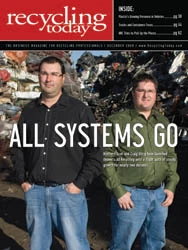RecycleBank Expands Program in Hartford, Conn.
The city of Hartford, Conn., has announced the citywide expansion of its its single-stream recycling program that uses the incentive program established by RecycleBank, based in New York City. The expansion follows the city’s pilot program, which began in May of 2008 and involved nearly 4,500 households.
“The city of Hartford is proud to announce that it is expanding single-stream recycling and the RecycleBank program to more Hartford households,” says Hartford Mayor Eddie Perez. Single-family households and multi-family buildings with up to six units began receiving 64-gallon blue recycling carts in late October that were purchased using funds dedicated for green initiatives from the stimulus package signed earlier this year by President Barack Obama, Perez says.
In May, the city of Hartford celebrated its one-year anniversary with RecycleBank, a partnership that serviced about 4,500 households in the city and more than doubled recycling rates, according to Hartford officials.
“Making Hartford sustainable makes perfect sense,” Perez says. “In the first year, those 4,500 households recycled more than 1 million pounds of waste. Not only does that make a tremendous impact on the environment, it also makes a tremendous impact on households and in kitchens across Hartford.”
RecycleBank services more than 1 million households across 21 states. The company recently announced a pilot program with the city of Atlanta in which 10,000 households will receive 96-gallon recycling carts retrofitted with an ID tag that enables the company to track recycling participation by residence.
RecycleBank also recently partnered with Waste Connections of Colorado to offer its services to 10 neighborhoods in the city of Denver.
Expanded Bottle Bill Goes into Effect in Connecticut
The state of Connecticut has expanded its bottle bill to require deposits on containers of water and flavored water.
“Expansion of the bottle bill has the potential to remove nearly 500 million containers per year from Connecticut landfills, protecting the environment while reducing litter,” says Gov. Jodi Rell.
The updated law requires a 5-cent deposit on most containers of bottled water and flavored, non-carbonated waters. It exempts 3-liter or larger containers, containers made from high-density polyethylene (HDPE) and containers from manufacturers that bottle and sell less than 250,000 noncarbonated beverage containers per year and that obtain an exemption from the state Department of Environmental Protection. Unclaimed deposits are expected to return an estimated $17 million per year to the state.
“A generation of Connecticut residents has grown up with recycling as the law of the land. They’ve learned to pick up, pack up and properly dispose of bottles and cans,” Rell says. “Adding water bottles to the recycling mix instead of our landfills is a natural move.”

Explore the December 2009 Issue
Check out more from this issue and find your next story to read.
Latest from Recycling Today
- Ferrous market ends 2024 in familiar rut
- Aqua Metals secures $1.5M loan, reports operational strides
- AF&PA urges veto of NY bill
- Aluminum Association includes recycling among 2025 policy priorities
- AISI applauds waterways spending bill
- Lux Research questions hydrogen’s transportation role
- Sonoco selling thermoformed, flexible packaging business to Toppan for $1.8B
- ReMA offers Superfund informational reports





